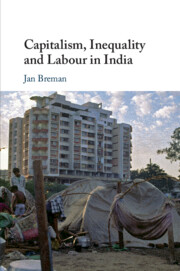Crossref Citations
This Book has been
cited by the following publications. This list is generated based on data provided by Crossref.
Datta, Amrita
2020.
Circular Migration and Precarity: Perspectives from Rural Bihar.
The Indian Journal of Labour Economics,
Vol. 63,
Issue. 4,
p.
1143.
Harriss, John
2020.
“Responding to an Epidemic Requires a Compassionate State”: How Has the Indian State Been Doing in the Time of COVID-19?.
The Journal of Asian Studies,
Vol. 79,
Issue. 3,
p.
609.
de Haan, Arjan
2020.
Labour Migrants During the Pandemic: A Comparative Perspective.
The Indian Journal of Labour Economics,
Vol. 63,
Issue. 4,
p.
885.
Srivastava, Ravi
2020.
Labour Migration, Vulnerability, and Development Policy: The Pandemic as Inflexion Point?.
The Indian Journal of Labour Economics,
Vol. 63,
Issue. 4,
p.
859.
Soliman, Ahmed M.
2021.
Urban Informality.
p.
223.
Kandikuppa, Sandeep
2021.
Value chains: the new economic imperialism.
Space and Polity,
Vol. 25,
Issue. 1,
p.
150.
Rai, Pronoy
2022.
Reconstructing culture: seasonal labour migration and the cultural geographies of social change in rural western India.
Social & Cultural Geography,
p.
1.
Chandhoke, Neera
2022.
The complexities of the urban [the case of Delhi].
Globalizations,
p.
1.
Nilsen, Alf Gunvald
2022.
India’s pandemic: spectacle, social murder and authoritarian politics in a lockdown nation.
Globalizations,
Vol. 19,
Issue. 3,
p.
466.
Brass, Tom
2022.
Twisted Trajectories, Curious Chronologies: Revisiting the Unfree Labour Debate.
Critical Sociology,
Vol. 48,
Issue. 1,
p.
7.
Sudheesh, R.C.
2023.
State Life: Land, Welfare and Management of the Landless in Kerala, India.
Development and Change,
Vol. 54,
Issue. 4,
p.
870.
Munjal, Kunal
and
Bamba, Ishaan
2023.
Migration, Vulnerability, and Protection: Changing Labour Law Regime in Contemporary India.
Asian Studies Review,
p.
1.
Tesema, Yonas
2023.
Towards Decent Employment or a Destitute Livelihood? The Dynamics of the Agrarian Question of Labor in Ethiopia.
Forum for Development Studies,
Vol. 50,
Issue. 3,
p.
445.
Mathew, Johan
2023.
Puff and Pull: Rickshaw Pullers through the Lens of Human Capital.
Monsoon,
Vol. 1,
Issue. 2,
p.
26.
Harriss-White, Barbara
2023.
Petty commodity production.
The Journal of Peasant Studies,
Vol. 50,
Issue. 1,
p.
295.
Sudheesh, R.C.
2023.
Adivasi migrant labour and agrarian capitalism in southern India.
Journal of Agrarian Change,
Vol. 23,
Issue. 4,
p.
755.
Pérez-Rivera, Gloria C.
2023.
Compounding financial frontiers: capital seeds and seeds for capital.
Journal of Cultural Economy,
Vol. 16,
Issue. 3,
p.
350.
Dash, Minati
2023.
Dispossession by Mining and Differentiation Among Young Men by Chalaki in Eastern India.
Contributions to Indian Sociology,
Vol. 57,
Issue. 1-2,
p.
122.
Shylendra, H. S.
2023.
Reimagining Prosperity.
p.
97.
Ray, Aditya
2024.
Coping with crisis and precarity in the gig economy: ‘Digitally organised informality’, migration and socio-spatial networks among platform drivers in India.
Environment and Planning A: Economy and Space,
Vol. 56,
Issue. 4,
p.
1227.





